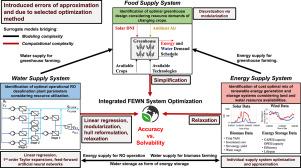克服粮食-能源-水关系优化中的建模和计算复杂性挑战
IF 3.9
2区 工程技术
Q2 COMPUTER SCIENCE, INTERDISCIPLINARY APPLICATIONS
引用次数: 0
摘要
粮食-能源-水关系(FEWN)假定,有关相互关联的粮食、能源和水资源的可持续决策必须全面考虑所有相关资源。由于其多尺度的复杂性,相互关联的 FEWN 优化仍面临建模挑战和计算难点。为了克服这些挑战,本研究提出采用基于数据驱动和模型优化技术的代用模型,同时量化因所选近似和优化方法而引入的误差。反过来,我们基于温室种植、可再生能源和反渗透海水淡化供水系统,推导出一个混合整数线性 FEWN 规划和调度优化模型,该模型最初在计算上是难以实现的。在利用松弛、模块化和凸壳重构等策略求解完整的 FEWN 供水系统之前,首先讨论并克服了能源-水关系供应系统的计算复杂性。本文章由计算机程序翻译,如有差异,请以英文原文为准。

Overcoming modeling and computational complexity challenges in food–energy–water nexus optimization
The food–energy–water nexus (FEWN) postulates that sustainable decision-making regarding the interconnected resources food, energy and water must consider all involved resources holistically. Due to its multi-scale complexity, modeling challenges and computational intractability regarding the interconnected FEWN optimization remain. To overcome these challenges, this work proposes employing surrogate models based on data-driven and model optimization techniques, while quantifying the introduced errors due to both the selected approximation and optimization methods. In turn, we derive a mixed-integer linear FEWN planning and scheduling optimization model based on a greenhouse farming, a renewable energy and a reverse osmosis desalination water supply system, which is initially computationally intractable. This computational complexity is first discussed and overcome for the energy–water nexus supply system, before solving the complete FEWN supply system by utilizing strategies such as relaxation, modularization and convex hull reformulation.
求助全文
通过发布文献求助,成功后即可免费获取论文全文。
去求助
来源期刊

Computers & Chemical Engineering
工程技术-工程:化工
CiteScore
8.70
自引率
14.00%
发文量
374
审稿时长
70 days
期刊介绍:
Computers & Chemical Engineering is primarily a journal of record for new developments in the application of computing and systems technology to chemical engineering problems.
 求助内容:
求助内容: 应助结果提醒方式:
应助结果提醒方式:


